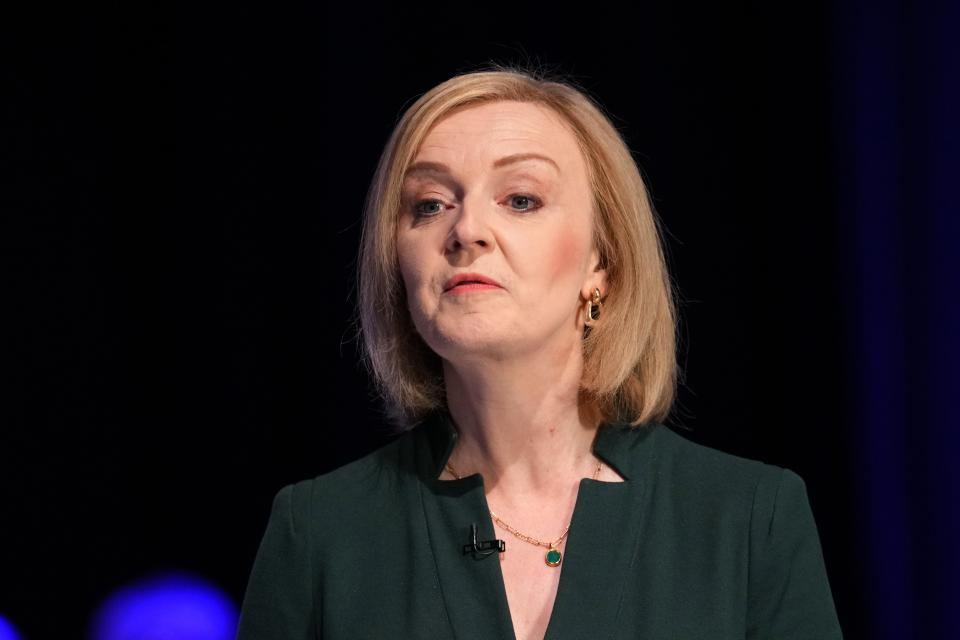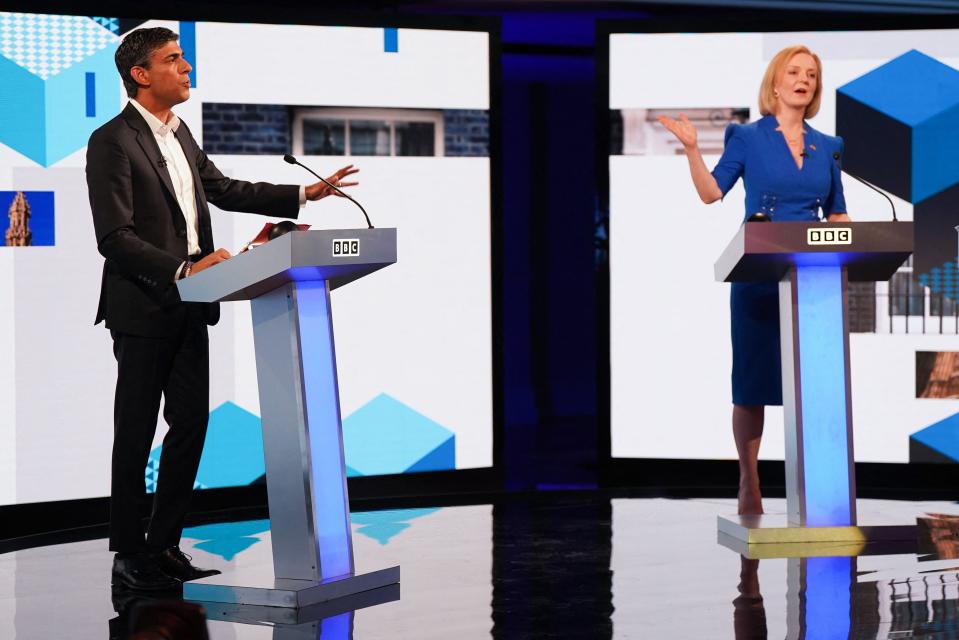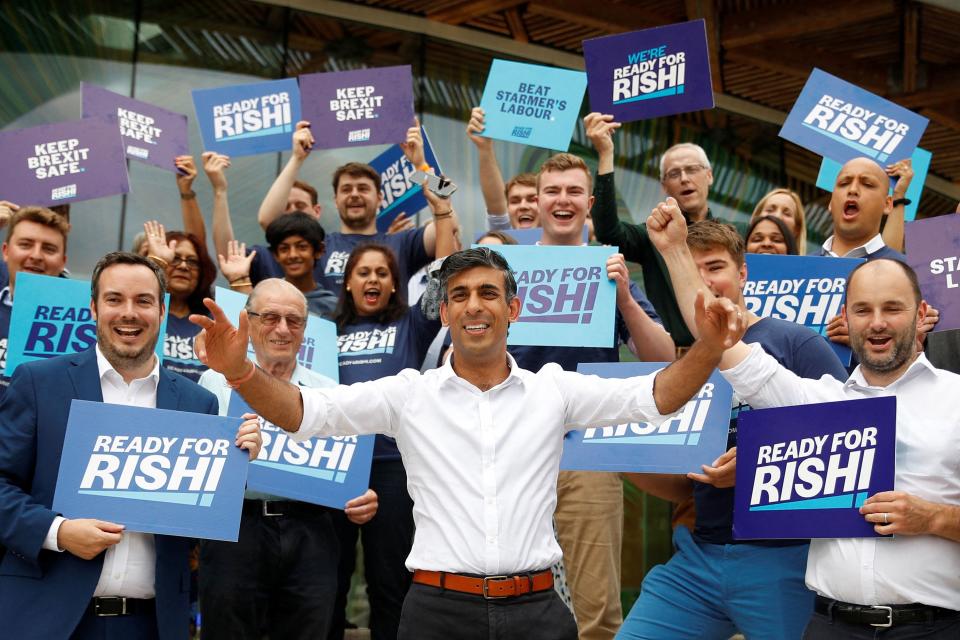After Boris Johnson, will the UK get a Thatcher-lite or buttoned-down former banker as new PM?
- Oops!Something went wrong.Please try again later.
- Oops!Something went wrong.Please try again later.
- Oops!Something went wrong.Please try again later.
- Oops!Something went wrong.Please try again later.
LONDON – A politician whose career is full of ideological U-turns and who has drawn comparisons to Margaret Thatcher, or a smooth-talking former banker whose fast rise to the top of British politics followed a privileged upbringing and lucrative marriage.
One of those two candidates – Liz Truss or Rishi Sunak – will be named as Britain's new prime minister by the ruling Conservative Party on Monday.
The selection of a new leader for America's closest ally comes after the July resignation of Boris Johnson, the country's colorful and often chaotic leader whose three years in power were defined by unconventional political wisdom, xenophobic gaffes, lies about the impact of Britain's exit from the European Union, appeals to nationalism and an increasingly fragile economy. Johnson resigned after senior members of his government turned against him amid a series of scandals connected to breaking his own coronavirus pandemic lockdown rules.
Under Britain's parliamentary system, voters elect a party, not a leader, giving the government in power some latitude to swap in a new prime minister, though it will be only the second time in British political history that the new prime minister is chosen by grassroots members of a political party – 160,000 of them – rather than by parliamentary colleagues or as a consequence of a general election, according to Tim Bale, a professor of politics at Queen Mary University of London.
Boris Johnson resigns: U.K. leader calls it quits as prime minister after deluge of scandals stirs clamor for his ouster

'An article of faith': UK-US alliance will remain strong
Relations between the U.S. and the U.K. – the so-called special relationship that is mostly manifested in close diplomatic and intelligence cooperation – will remain largely unchanged regardless of who is the next prime minister, political experts predict.
"The Conservative Party is staunchly Atlanticist," said Matt Beech, director of the Center for British Politics, University of Hull, England, referring to the belief in the close military, political and economic cooperation between the U.S. and U.K.
"It's almost an article of faith."
In fact, the impact of the change at the top of the British political pyramid will chiefly be on domestic policy, in particular, what to do about Britain's fast-moving cost of living crisis that's been fueled by the coronavirus pandemic, Russia's unprovoked war in Ukraine and Britain's almost two-year-old exit from the EU – Brexit. All three events have disrupted supply chains and led to spiraling consumer costs.
As in the U.S. midterms, inflation has been front and center in the contest to succeed Johnson. Yet some experts say it is not clear whether Truss or Sunak have developed sufficiently detailed or even realistic plans to deal with increasingly grim assessments of household budgets.
Major campaign issue: skyrocketing energy costs
By October, just as the cold months set in, a typical British household is expected to pay around $4,200 a year to heat and power a home, according to Ofgem, Britain's energy regulator. It represents an 80% annual rise in home energy costs.
Forecasts suggest that energy bills could reach more than $7,700 early next year, more than many pay for rent or a mortgage. Food and fuel prices have also risen significantly, potentially jeopardizing the solvency of many small businesses – the country's six largest breweries said pubs across the U.K. could be forced to close – and leading to warnings from independent personal finance experts such as Martin Lewis that "people will die this winter" if they don't get adequate help from the government to pay their energy bills.
Truss, 47, the front-runner, the daughter of two teachers, is a political changeling who argued for the U.K. to remain in the EU but became a passionate Brexit convert while serving in Johnson's government, first as international trade secretary, and then as foreign secretary. She once called for the abolition of the monarchy, legalization of cannabis and was a Liberal Democrat, an opposition political party dedicated to civil rights and a progressive agenda and a long way from the Conservative Party's Euro-skeptic, low-tax agenda.
'Bewildering, dire, disastrous': Queen has a Brexit escape plan. How bad will it be?
Truss has been tight-lipped about her plan to deal with the energy crisis, providing only vague promises of "immediate support" for the most vulnerable families while doubling down on a tax-cutting platform in line with the Conservatives' ideological roots.
Sunak, 42, attended Winchester College, one of Britain's most prestigious boarding schools, before enrolling at Oxford University (Truss also went to Oxford). He is the son of a doctor and pharmacist. Before embarking on a career in politics, Sunak worked for Goldman Sachs and at a hedge fund. He met his wife, the daughter of the co-founder of Infosys, one of India's largest technology companies, while studying for an MBA at Stanford University. The couple have an estimated wealth of $1 billion, according to The Sunday Times Rich List, an annual gauge of the 1,000 wealthiest people and families resident in the U.K. Sunak served in Johnson's cabinet as finance minister.
Sunak has vowed to temporarily abolish the sales tax on energy bills. His candidacy has been tainted, in part, by the multibillion dollar support package for businesses and workers he engineered as finance minister in Johnson's government amid fears of mass unemployment during the pandemic. Such big-state intervention doesn't sit well with Conservatives, many of whom objected to the U.K.'s lengthy coronavirus lockdowns.
"One of the problems with this leadership contest is that the candidates have to address an audience who are fairly unrepresentative, both demographically and ideologically, of the country as a whole," said Bale, referring to the 160,000 Conservative Party activists who will choose the next prime minister. They have been given the power to select Britain's leader as a result of a rule change. Previously, lawmakers made that choice.
"So, what they tell that audience may not give us an accurate picture of what they'll actually do once in Downing Street. Hopefully, they have some ideas up their sleeves for tackling some of the immediate issues," Bale said.

Does Washington want Truss or Sunak?
Truss is viewed favorably by U.S. conservatives, while Democrats would probably prefer Sunak to become the next prime minister, said Nile Gardiner, director of the Margaret Thatcher Center for Freedom at the Heritage Foundation, a conservative think tank based in Washington. Whereas Truss is outspoken and often seen as ideologically-driven, Sunak is regarded as a leader more in the mold of President Joe Biden.
Gardiner said Sunak is viewed as button-downed and Bidenesque in terms of style – calm, substantive and a bit of a policy wonk – and his political ideology is similar to Biden’s in many areas.
"Sunak is seen by the American left as someone they can do business with," Gardiner added. "Liz Truss is ... more likely to stand up to Joe Biden's agenda."
Still, neither Truss nor Sunak is likely to dramatically split with the Biden administration over hot-button geopolitical issues, such as China-related security matters, the Iran nuclear deal, or pressuring Russia over its war in Ukraine.
The White House did not respond to questions about whether Biden favors Truss or Sunak as the next prime minister. White House press secretary Karine Jean-Pierre has said the administration will not comment on another country’s democratic process.
US priority: Protecting the Good Friday agreement
However, one area that could be a source of U.S.-U.K. tension is over what should be done about the border between Northern Ireland, which is part of the U.K., and Ireland, which is part of the EU. Truss, as the U.K.’s foreign secretary under Johnson, has been leading the government’s push to rework the legal framework that governs the customs and immigration issues at the Irish border, called the Northern Ireland Protocol.
Brexit: A departure that raises the stakes for Northern Ireland
Before Britain withdrew from the E.U., goods could be transported between Northern Ireland and Ireland without border checks. A new framework was needed because of Brexit. But British companies complain the new system, which requires border checks for certain goods when they enter Northern Ireland from Britain, such as foods for which the EU has strict rules, is too bureaucratic and requires too much paperwork.
Conservatives also have grown increasingly hostile to the new framework, arguing it leaves Northern Ireland more closely integrated with the EU than the rest of the U.K. and ignores surveys that show more people in Northern Ireland favor remaining part of the U.K. than believe a united Ireland is in their best interests. (Muddying the waters: Northern Ireland overall voted in favor of remaining in the EU – against Brexit.)
Biden, who often talks about his Irish Catholic heritage, and other Democrats, including House Speaker Nancy Pelosi, have raised concerns that tearing up the protocol could reignite border tensions between Ireland and Northern Ireland that had mostly subsided with the signing of a pair of peace agreements between the British and Irish governments in 1998. The U.S. helped broker the pacts, known as the Good Friday Agreement.

"A blowup could happen over the Northern Ireland Protocol, and if it does lead to real issues, including violence or some sort of uncertain future for Northern Ireland and the Republic of Ireland, that would be problematic for the U.S.," said Dan Hamilton, a foreign policy expert at the Brookings Institution’s Center on the U.S. and Europe.
Will the UK take a liberal turn in the next election?
Whoever emerges as Britain's new leader – polls give Truss a large lead – may need to start thinking about 2024, when Britain's next general election is scheduled to take place. Johnson's character, his lack of political discipline and disregard for facts over Brexit and other issues sharply divided lawmakers and the court of British public opinion.
But it was also these qualities and his single-minded insistence that he would "get Brexit done" that played a large role in catapulting Johnson to power in 2019.
Now polls show that support for his Conservative party is collapsing. The latest YouGov/Times voting intention poll shows a wide lead for the opposition Labour Party.
"There's going to be some buyer's remorse. Some (parliamentarians) are already saying: 'Gosh, why have we done this,'" Beech said of the decision by Conservative lawmakers to push for Johnson's resignation over the summer. "Ultimately, though it was the right thing to do because his lies caught up with him," he added.
Beech noted that Truss is not alone in changing her views on the EU and that Thatcher only became a Euro-skeptic toward the end of her long political career.
"If you're a woman at the top of the Conservative Party, comparisons to Thatcher are hard to avoid," Bale said of suggestions that Truss has sought to portray herself as the heir to the "Iron Lady," Britain's first female prime minister who championed a small state, free markets and oversaw the privatization of many British industries from telecoms to gas. Thatcher had a storied political love affair with Ronald Reagan.
"Theresa May tried the same thing," he said of Johnson's predecessor, who was forced from office after failing to unite a fractious Conservative Party over Brexit. "Thatcher is a kind of secular saint for Conservatives. It's hard for anyone to match her iconic status."
Collins reported from Washington.
This article originally appeared on USA TODAY: The new prime minister of UK will either be Liz Truss or Rishi Sunak

